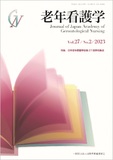Japanese
English
- 販売していません
- Abstract 文献概要
- 参考文献 Reference
抄録
本研究の目的は高齢者看護において目標志向型思考を用いる意義と課題を明らかにすることである.一般病院の看護師13人に半構造化面接を行い質的帰納的に分析した結果,意義として【高齢者の残存機能に関する視点の獲得】【高齢者が入院生活をよりよく過ごすためのケアの提供】【高齢者が退院後も望む生活を送るためのケアの提供】【高齢者の価値観や思いを尊重したケアの提供】【高齢者看護に対する新たな気づきの獲得】,課題として【目標志向型思考に関する知識の不足】【問題解決型思考との相違に対する違和感】【疾患の治療など優先すべき業務の多忙さ】【高齢者の望みや生活をとらえることへの困難感】【目標志向型思考を活用する体制の不足】のそれぞれ5カテゴリーが抽出された.目標志向型思考の活用においては,高齢者をとらえる視点など教育内容の検討,意義を実感できる場の調整,高齢者のもてる力や望みを計画に反映できる体制整備が必要である.
This study aims to clarify the significance and issues by applying goal-oriented thinking in gerontological nursing care. Semi-structured interviews were conducted with 13 nurses working at general hospitals and the data were analyzed using qualitative descriptive research. As a result, we extracted five significances, including [acquisition of perspective on the residual functions of older adults], [provision of care for older adults to have better hospital stays], [provision of care for older adults to lead the life that they hope for after hospital discharge], [provision of care that respects the sense of values and thoughts of older adults], and [acquisition of new awareness for geriatric nursing care], as well as five issues, including [lack of knowledge about goal-oriented thinking], [discomfort about discrepancy with issues-solving type thinking], [the pressure of duties that should take priority, such as disease treatment], [sense of difficulty in understanding the desires and lifestyle of older adults], and [lack of a system to apply goal-oriented thinking]. To apply goal-oriented thinking, we must examine educational content, such as gaining perspective to understand older adults, preparing a place where the significance by applying goal-oriented thinking can be realized, and putting in place a system that enables the strengths and desires of older adults to be reflected in the plan.
Copyright © 2023, Japan Academy of Gerontological Nursing All rights reserved.


